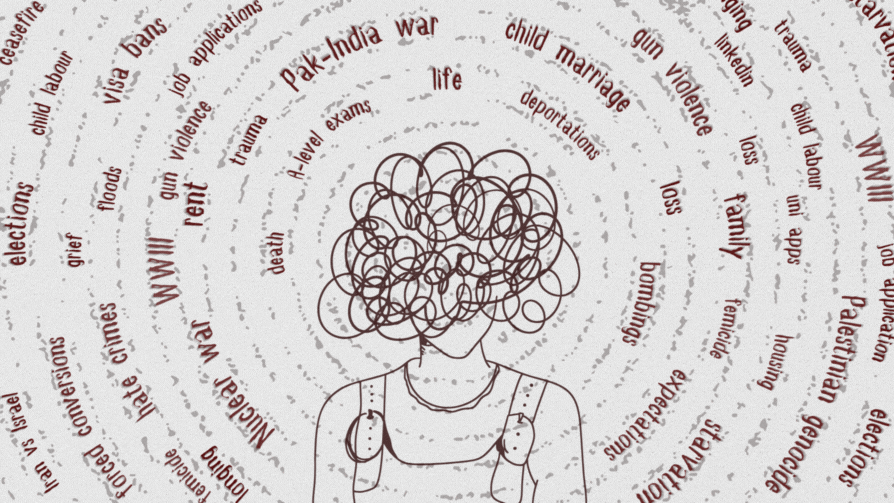‘If those who inherited it are in such pain, how did she go through it?’ — Breaking the cycle of generational trauma
TRIGGER WARNING: MENTIONS OF SEXUAL ABUSE AND SELF-HARM
“Everyone keeps reminding me that my pain has made me stronger, however, I would never willingly choose this pain. I was not supposed to be this sad at such a young age,” said 28-year-old Aniqa, who’s seeking therapy for generational Post Traumatic Stress Disorder.
In the past few years, conversations around mental well-being have gotten stronger. No matter where you go, you’ll find at least one person who’s very passionately advocating for mental health, and, with such discussions, more attention is now being paid to what women go through. Postpartum depression has been discussed comprehensively in recent years, which led us to the conclusion that major hormonal changes can cause depression in women after giving birth.
Similarly, all these conversations have also familiarised us with another term — generational trauma. In simple terms, generational trauma can be defined as mental baggage carried from generation to generation. This mental turmoil can be caused by anything, from historical occurrences, cultural influences, or individual life events and its consequences can manifest in different ways.
As a student of medicine, I studied gynaecology very thoroughly. Every time I’d come across a case study involving psychoanalysis of generational trauma, it was usually passed on by the mother. It is also a common belief that a child inherits the stress the mother goes through during the nine months of pregnancy.
Through narratives, cultural customs, rituals, assigned roles, traditions, beliefs, and even inherited genetic factors (epigenetics), generational trauma can permeate familial dynamics. Its effects can lead to collective emotional distress, such as depression, anxiety, and somatic issues. Shared behavioural patterns may emerge, including avoiding conflicts, blaming others, and resorting to substance use or overspending to numb emotions.
Common coping mechanisms may include not seeking help, ruminating, internalising thoughts, or engaging in self-harm and isolation. Moreover, generational trauma can shape the family’s worldview, cultural identity, and interpersonal interactions.
“My family migrated from India at the time of Partition, and they had to live in refugee camps. My grandmother was pregnant with my mother, and she had to go through brutal sexual abuse. Amma often says that it was a miracle that she survived through it all,” Razia Bano, 70, told Images.
“I have narrated this tale to my grandchildren so many times because I have seen their hands trembling at a very young age. My own daughter could not sleep at night and would wake up with heart-wrenching screams. I could not understand why. Later, I took her to a doctor when she turned 25 and I caught her cutting her own hand. The doctor told me that she inherited PTSD from me,” she said.
“I could not see the signs, but now I can when I see my granddaughters being anxious. I instantly know that the trauma has creeped inside all of us, and maybe we’ll never be able to break free of it,” she said, tears rolling down her cheeks.
Razia opted for therapy when her daughter Anzela started self harming. “I didn’t even know what psychology was. It was not common back then. If you went to a psychiatrist, people would assume you were crazy. I hid it from my entire family, including my husband. Initially, I’d take Anzela to a psychiatrist because she’d say ‘Amma, ajeeb sa dard hai dil main, sahi nahi hota’ [mother, I have a strange pain in my heart, it does not heal] and my entire heart would become a living wound. I saw my child suffering from pain she did not deserve,” she recalled.
“Eventually, while seeking help for my daughter, I realised I needed it even more than her, because I was the source of her pain. She inherited it from me,” she said.
Razia went to therapy for over three years and Anzela sought professional help for two and a half years until she stopped self-harming.
“[In therapy] I discovered the intensity and depth of the pain we both went through. It made me think of my mother, because if the people who inherited it were in so much pain, how did she go through it?” Razia mused.
Aniqa, a mother of two, is reaching out for professional assistance to address her PTSD, which resulted in the development of clinical hyperactive anxiety. She has been affected by generational trauma stemming from a history of domestic violence within her family. Her grandfather murdered her grandmother by burning her to death.
“My mother witnessed it, and all her life, she was terrified of fire. She could not light a matchstick, and would run away at the sight of anything remotely close to yellow. As a child, I could not understand what this condition that she experienced so often was. Later in life, I was told by my aunt about the trauma she witnessed, and somehow, all of it made sense,” she said.
“When I went to university, I once told one of my teachers that I cannot wear yellow because it gives me a very ‘icky’ feeling, and whenever I see fire I turn my face away because I feel it’s coming for me. She went quiet for a second, and then she politely asked me to see a therapist, I was 19 back then.”
Therapy helped her explore that trauma. “In therapy, my generational trauma unfolded and I discovered that when my hands tremble, my heart pounds really fast, and I can’t sleep at nights, it is not normal. I have hyperactive anxiety,” she said.
Stayed in therapy until she was 21, and then went back at 26, when she got married, because she had a horrible fear of getting married.
“I knew I had the triggers rising again when I would shut myself down and not talk to anyone for days. I would drown myself in work on some days, just to avoid thinking, and on some days I wouldn’t even get out of bed, because the heaviness of my heart would be too much,” she said.
“I am still going to therapy, seeking help for my triggers one by one. My mother was not able to break the cycle, but I will,” she vowed.
Research indicates that signs and symptoms of generational trauma may encompass a lack of self-worth, anxiety, de-personalisation (feeling detached from oneself and surroundings), depression, emotional numbness, and impaired life skills, such as critical thinking, decision-making, and time management. Additionally, individuals affected by generational trauma may experience PTSD symptoms like social isolation, negative thoughts, and loss of interest in hobbies.
There is also evidence suggesting that generational trauma could impact the immune system. A 2021 study examining genes related to immune health among the offspring of Holocaust survivors revealed that some of these genes were less active than average, leading to decreased innate immunity — the immunity one is born with.
“Trauma influences genetic mechanisms, resulting in an increased sensitivity to traumatic reactions among populations exposed to significant trauma,” Dr Nausheen, a psychologist serving at Umeed-e-Nau clinic in Karachi, told Images.
“Most women who have inherited PTSD or any kind of mental illness caused by generational trauma have similar menstruation cycles — their period is irregular, their sleep cycles are not normal, and their physical health is not very stable,” she said.
“People experiencing generational trauma may possess specific genes that exhibit altered expression patterns, thereby increasing their susceptibility to certain conditions, such as anxiety and depression,” she added.
Stressing on the importance of consistent therapy, she said that intensive therapy is the only way to cope with the emotional baggage that has been passed on to people from their ancestors.
“There is a need for acceptance and that is the first step towards healing. Especially for women, therapy is essential, because every woman I know has experienced something so traumatic that it would shake you to your core,” Dr Nausheen explained.
The generational abuse women have endured for ages has left permanent marks on them, as well as the generations they have raised. Ignorance of their traumas has caused them to suppress the pain they go through, and this is likely to continue until they decide to break the cycle of pain.














Comments